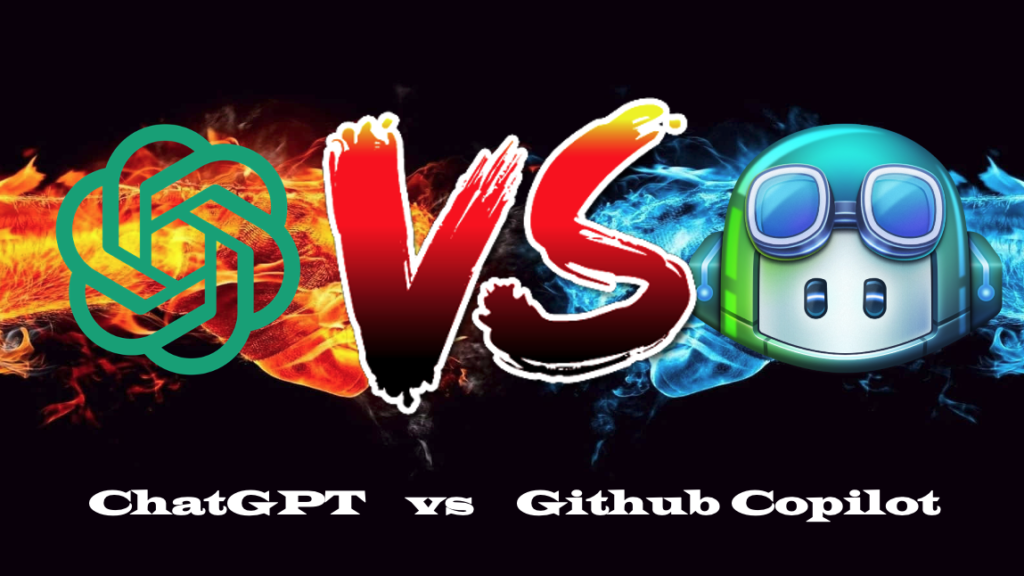There is lot of noise in the industry about ChatGPT and Copilot. So I decided to spend the first warm days of summer to explore these 2 technologies.
There are lot of screenshots in this post, you can right-click and open them in new window to look into them
I built a small Book project as a SpringBoot service with REST endpoints.
Book has multiple authors and Book has a publisher, the project uses H2 as an in-memory DB. Its like 1-2 hrs of task for someone who is familiar but not too much hands on.
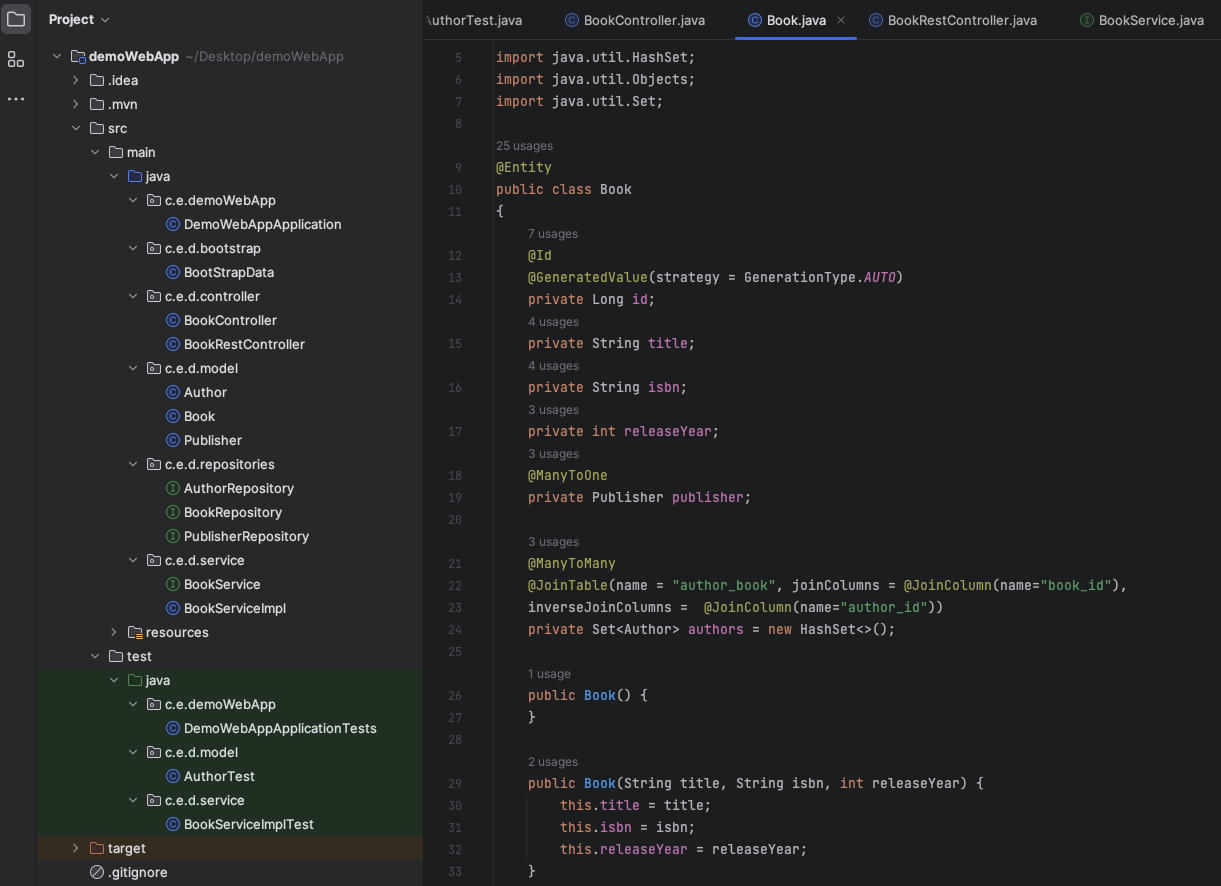
ChatGPT
First lets try out ChatGPT to generate this equivalent code for us. Generally you cannot have connected classes in ChatGPT and it starts getting complex very fast.
I asked for some reverse prompts on the controller code and it gave me the following suggestion on how to generate that controller in spring boot.
Create a Spring Boot REST Controller named “StudentRestController” that handles HTTP requests related to a “Student” entity. The controller should have the following methods:
1. A method that returns a ResponseEntity containing a list of all students in the database. The HTTP endpoint for this method should be “/students” and the HTTP method should be GET.
2. A method that returns a ResponseEntity containing a single student with the given ID. The HTTP endpoint for this method should be “/students/{id}” and the HTTP method should be GET.
3. A method that creates a new student in the database. The HTTP endpoint for this method should be “/students” and the HTTP method should be POST. The student object should be sent in the request body.
4. A method that updates an existing student in the database. The HTTP endpoint for this method should be “/students/{id}” and the HTTP method should be PUT. The updated student object should be sent in the request body.
5. A method that deletes an existing student from the database. The HTTP endpoint for this method should be “/students/{id}” and the HTTP method should be DELETE.
It gave me some good code for the controller when I used the prompt in a new window, and then I asked the following.
Can you generate the StudentRepository for the above code
Can you move the business logic in code to a Service class
This gave me a service class and updated my controller to refer to service class
Can you add a test class for the service class
Can you add a method to find students whose name starts with John
Can you add comments to above codes
Can you add a method to get Students with first name John and last name Smith
Can you generate studentrespository code also
Can you provide inplementation of this for mysql
It properly generates the class and updates the test case as well
But the question is how many times will you write pojos, controllers, the bolier plate code. And remember I started with Book, Author, Publisher and am ending with Student controller which does not have any relation with other beans. It is a single level class with no dependencies any more.
Next I want it to generate this basic utility code
boolean checkFlagValue() {
return Boolean.FALSE.toString()
.equalsIgnoreCase(
env.getPropValue(IPropConst.MY_FLAG, "false")
);
}The reverse prompt it suggests is
Write a method that checks the value of a boolean flag named “MY_FLAG” in an env property file. The method should return false if the flag is not present in the property file or its value is not equal to “true” (ignoring case), otherwise it should return true.
which gives me this code (when I use a new session)
public static boolean checkFlag() {
Properties prop = new Properties();
boolean flagValue = false;
try {
prop.load(new FileInputStream("env.properties"));
String flag = prop.getProperty("MY_FLAG");
if (flag != null && flag.equalsIgnoreCase("true")) {
flagValue = true;
}
} catch (IOException ex) {
System.err.println("Error loading properties file.");
ex.printStackTrace();
}
return flagValue;
} This code starts with no context, it will take a developer 10 seconds in a IntelliJ to write the code which I was expecting. and 1 min to write the test case for it. But to think or the right prompt and to type it out, and then pick and choose the right snippets, 20 mins minimum.
I will not even try any more complex code which I am keeping for Copilot.
Copilot
I tried copilot on the same Book project

When I created the controller for a Spring REST service, it prompted me with following methods
sortByYear
sortByRating
sortByCategory
sortByPublication
sortByPriceRange
sortByYearRange
And LOT more.
I do not have all these attributes in my Book class. Why are you not looking at reference Haiyaa (I am talking like Uncle Roger now)
It completely ignored the Book class which I had, which tells me its just suggesting from internet code and not referencing what is already there, which defeats the purpose of an IDE integrated solution.
I let it write the code for me for all the above functions, I will roast it later. Then IntelliJ helped me to add these methods to Service interface and to add skeleton code in the implementation class.
Then I asked Copilot to generate the implementation of the junk methods it proposed to me. Well its only suggestion was to “return null” 🙂
Some Legit testing
The first function was already there written by me. I am trying to write getBooksByIsbn which did not exist in my code.
Its primary suggestion was to go to BookRepository and add relevant methods for the task, but in one of the alternate solutions it looked at my code and gave me a similar option to get Books by ISBN
public List<Book> getBooksYearBefore(Integer yearAfter) { // MY CODE
return StreamSupport.stream(bookRepository.findAll().spliterator(), false)
.filter(book -> book.getReleaseYear() < yearAfter )
.collect(Collectors.toList());
}
public List<Book> getBooksByIsbn(String isbn) { // GENERATED CODE
return StreamSupport.stream(bookRepository.findAll().spliterator(), false)
.filter(book -> book.getIsbn().equals(isbn) )
.collect(Collectors.toList());
}Then I wanted to mess around with it, I made my code wrong.
And it gave me wrong suggestion. It did not identify the simple variable naming error.
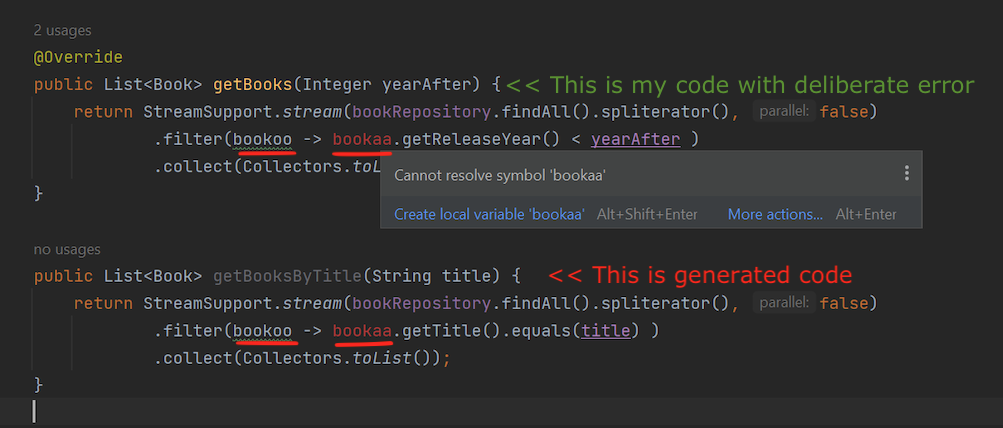
Next lets test it with the same utility function which we gave to ChatGPT
My prompt here is as follows:
// method to check value of a boolean flag named “MY_FLAG” in an environment property file.
// if the flag is set to true, then the method returns true, otherwise it returns false.
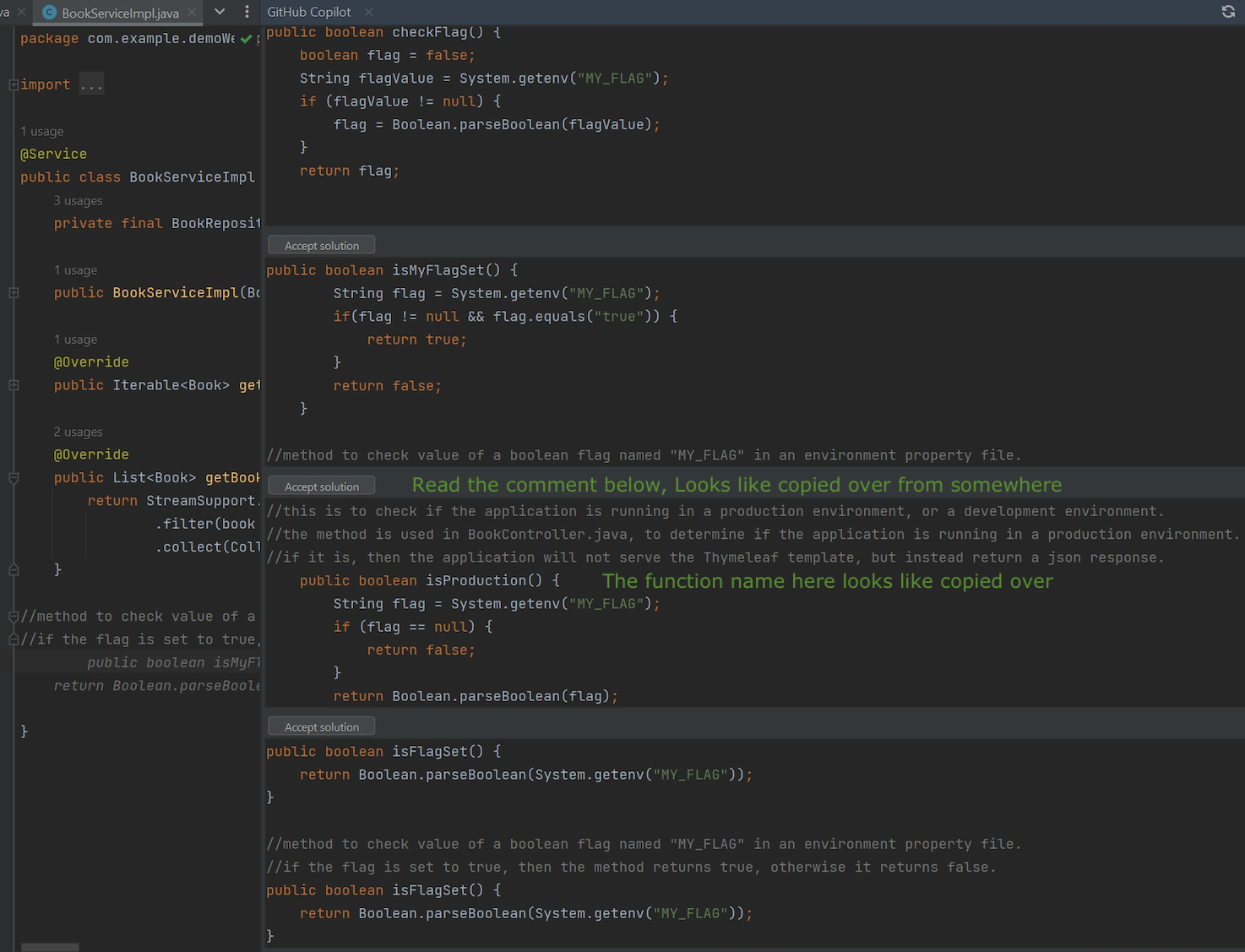
Instead of choosing one of the options after taking 2 mins to write a good enough prompt, I cannot spend time to look at proposals.
Apache storm code
Now lets try to work with some open source code and see what we get from copilot (This I did not do with ChatGPT)
I took apache storm code from https://github.com/apache/storm/ and am playing around with a utility file
https://github.com/apache/storm/blob/master/storm-core/src/jvm/org/apache/storm/utils/Monitor.java
There is a metrics function which is printing out some telemetry data.
The function is already overloaded and I am trying to build a Copy of the same function which will be doing a subset of original code. This is what I want.
public void metricsCopy(Nimbus.Iface client) throws Exception {
if (interval <= 0) {
throw new IllegalArgumentException("poll interval must be positive");
}
long pollMs = interval * 1000;
long now = System.currentTimeMillis();
MetricsState state = new MetricsState(now, 0);
Poller poller = new Poller(now, pollMs);
do {
metrics(client, now, state);
try {
now = poller.nextPoll();
} catch (InterruptedException e) {
e.printStackTrace();
}
} while (true);
}When I start typing the function, copilot starts suggesting some annoying options. At this stage it genuinely starts reminding me of the Microsoft paperclip.
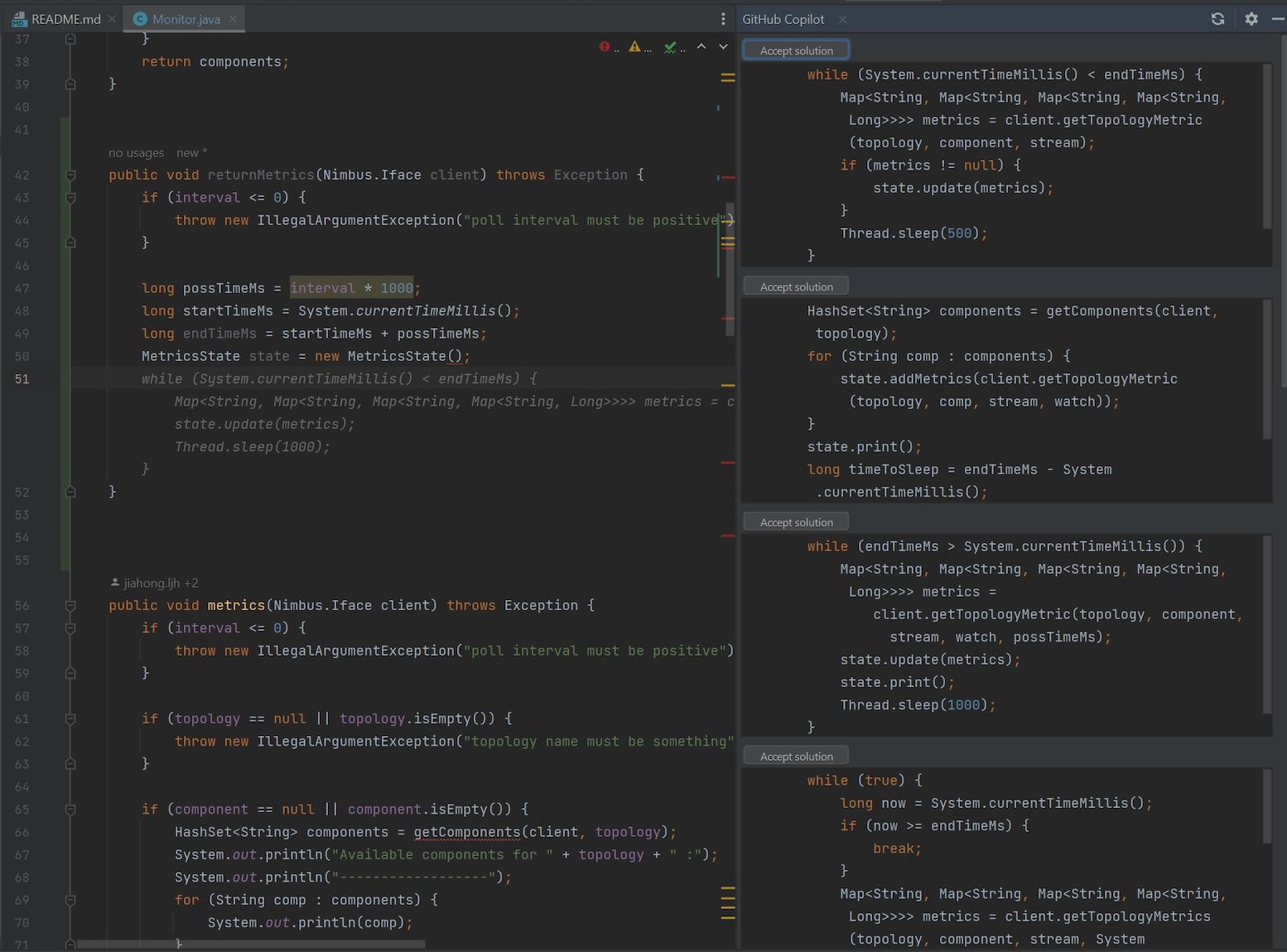
These are the options it proposes
What is the point of all these proposals, does it know what I am trying to do, Am I supposed to go over all 10 options to check if there is a matching solution and pick that, or type my code in 10 seconds and be done with it.
What is good for which audience.
Students
Generate some text book assignment code -> OK (nobody is looking 🙂 )
Typically work on algorithms or Hello world code which is never actually used in real world -> You can use ChatGPT but it hinders learning
Start with a mostly correct code from ChatGPT -> Well mostly correct does not mean anything in coding. If you do not know what you are writing then you are not learning. Trying to fix someone else’s code is a nightmare.
Single file code with no external references or structure – ChatGPT may be OK to generate this like 1 or 2 files
New Programmers
These people mostly learn by fixing bugs in existing code. For that they need to understand what existing code is doing and exactly where to make a change
Chat GPT is useless for this scenario, unless you go ahead and paste your entire codebase there ..
They sometimes need help in structure / design / reference of another module, for this Google / stackoverflow is enough on how to refer some outside dependency, there are lot of examples and tutorials to explain these.
Nobody asks you to write binary sorts in office, and even if you need to do it, that already exists.
You want a Fourier transform in java. the first search in google leads you to right path https://stackoverflow.com/questions/3287518/reliable-and-fast-fft-in-java
Experienced programmers
They will find these tools as a crutch. A fun to experiment, to add to resume, but not beyond that.
They can code much much faster than writing questions and looking at suggestions. The code is already there in their brains, and IDEs nowadays are so advanced they don’t have to type much, everything keeps getting prompted / auto-suggested. Experienced people can write 100 line code in 1-2 mins.
Management who has never coded
Well !! there are 2 types here, The cautious one, or the know it all.
There is supposed to be a balance between two, caution also is good to some extent but that should not interfere with the technology advancement.
Best is to evaluate, experiment, let some people play with it and then do a second round of analysis.
My take
There are many horror stories on Copilot on the internet. Just google “Who owns the code which copilot generates“
People are complaining their code is copied over verbatim
Tim Davis shows how his code is copied over without acknowledging his contribution Tweet from Tim
Copilot itself says https://github.com/features/copilot#faq-privacy-copilot-for-individuals
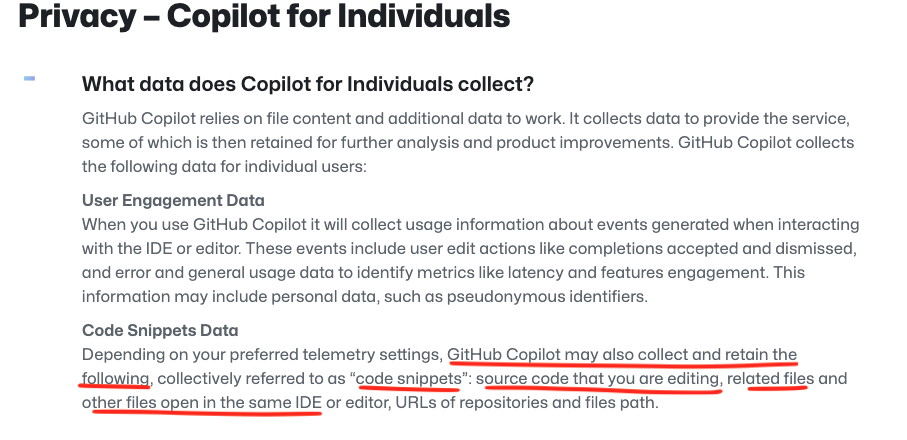
When you signup for copilot you are offered privacy, but how much is honored?
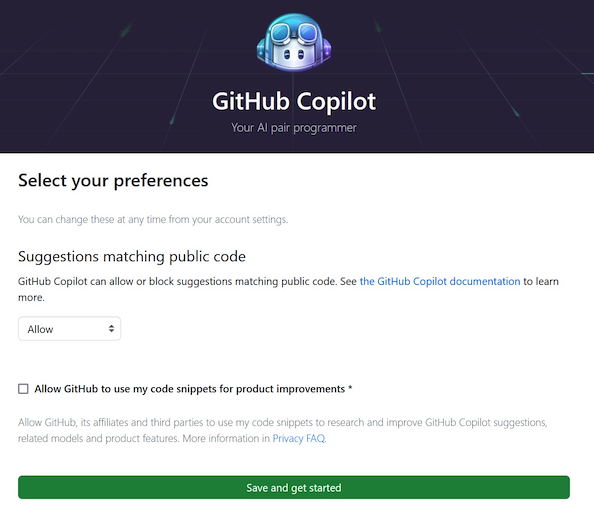
This makes me ask
How did it learn to generate code?
It went through open source code (may be copyrighted also since github is owned by microsoft), and is spitting out same code from developers.
Does merging 2 copyrighted code and making a new code makes it a new copyright?
This is really debatable, depends on how much is copied and how much is added by the user. If you took a date time function and used it to format a date according to timezone / localization in your bigger app, it may not be an issue, but if you pulled in something big then it will be a problem. (I am not a lawyer). But you do not have to invent the universe every time you want to make an apple pie from scratch.
Is open source code not copyrighted?
Who said that, its definitely copyrighted, and usable under various licenses.
The following videos show some terrible facts
https://www.youtube.com/watch?v=ORZZbxKNeUI
Scroll to minute 14:00 or so. Daniel is trying his best to show the good side of Copilot, but you see the code which is getting generated / suggested is containing lot of comments from the original authors in the suggestions.
https://www.youtube.com/watch?v=b9u3ZAGQmT0
Mr. Engineer Man seems to be very opinionated but he is correct in his analysis which is based on facts coming from Github website itself.
After looking at all these videos I could not put this software on my office laptop. So I created this entire post and the code associated with it on open source and my own code on home laptop.
Naturally based on my analysis, I feel the time is not yet ripe for this to be mainstream. ChatGPT is good for students, not for anyone else. Copilot has some legal issues and is like the Interrupting cow in the knock knock joke (Ref: Home movie).
I would still not want anyone to be left behind, so suggest looking at these technologies, play around with them, see where the industry is going, see how it was created, read about Reinforced learning, and Generative frameworks.
In an aircraft when the copilot or pilot snatches the controls from the other person, they say “I have control”.
With this kind of a copilot in my cockpit “I have control“
Cheers – Amit Tomar
